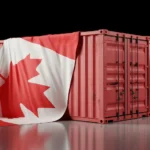How Homebuyers & Investors Should Prepare for New Tariffs to Canada

On March 4, 2025, former U.S. President Donald Trump confirmed the implementation of 25% tariffs on imports from Canada and Mexico, excluding energy products, which will face a 10% tariff. This aggressive trade policy has triggered immediate economic repercussions, particularly impacting mortgage rates, real estate trends, and financial markets in North America.
Table of Contents
- Immediate Economic Reactions
- Stock Market Volatility
- Inflation Concerns & Consumer Goods Impact
- Impact on Mortgage Rates & Real Estate
- Rising Mortgage Rates Due to Inflation
- Construction Costs & Housing Prices
- Real Estate Investment Uncertainty
- Expert Insights: Cannect’s Perspective on Mortgage Strategies
- Conclusion
With inflationary pressures mounting and interest rate hikes on the horizon, homebuyers, homeowners, and real estate investors must navigate these uncertain economic conditions.
Immediate Economic Reactions
Stock Market Volatility
Financial markets reacted swiftly to the tariff announcement:
- The Toronto Stock Exchange (TSX) dropped 1.54% (-391 points).
- The Dow Jones Industrial Average (DJIA) fell by 1.48% (-649 points).
- The Canadian dollar weakened by 0.26%, trading at 0.6906 USD.
Inflation Concerns & Consumer Goods Impact
The tariffs will likely increase the cost of imported goods from the U.S., leading to inflation. Key sectors affected include:
- Housing & Construction – Higher costs for lumber, steel, and other building materials.
- Consumer Goods – Price hikes on essential items such as food, textiles, and electronics.
- Automobile Industry – Increased prices on imported vehicles and parts.
With inflation rising, the Bank of Canada (BoC) may implement rate hikes to control economic instability, directly impacting mortgage rates.
Impact on Mortgage Rates & Real Estate
Rising Mortgage Rates Due to Inflation
When inflation rises, central banks increase interest rates to stabilize the economy, leading to higher mortgage rates and making borrowing more expensive. Homeowners with variable-rate mortgages experience increased monthly payments, while new buyers face affordability challenges as financing costs escalate.
Construction Costs & Housing Prices
Rising tariffs on steel and lumber drive up construction expenses, making homebuilding more costly. As a result, home prices increase, reducing affordability for buyers. Additionally, higher costs may lead to slower construction and potential project delays. With homeownership becoming more expensive, the demand for rental properties is likely to rise.
Real Estate Investment Uncertainty
Economic uncertainty from the trade war affects investor confidence, and rising mortgage rates may further impact the housing market. As borrowing becomes more expensive, real estate investment returns could decline, prompting investors to explore alternative opportunities. This shift may reduce demand in the housing market, leading to potential price volatility in major Canadian cities like Toronto, Vancouver, and Montreal.
Expert Insights: Cannect’s Perspective on Mortgage Strategies
Leading mortgage advisory firm Cannect emphasizes the importance of proactive financial planning in response to economic shifts. Their key recommendations include:
- Locking in Fixed Mortgage Rates – Protect against future interest rate hikes.
- Refinancing Before Further Rate Increases – Evaluate options to secure better terms.
- Monitoring Economic Indicators – Stay informed about Bank of Canada policies and trade developments.
Conclusion
The newly imposed U.S. tariffs on Canada and Mexico mark a significant escalation in trade tensions, creating ripple effects in the mortgage and real estate markets. Rising inflation, increased borrowing costs, and economic uncertainty will challenge homeowners, buyers, and investors.











